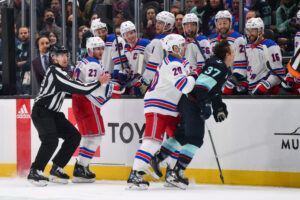The Franchise Best Series comes to you to dive into the all-time best single season for every organization. This, of course, includes post-season results. Join us for a look back at some of the most memorable moments in each franchise’s history. Here is the Edmonton Oilers best season.
Franchise Best: Edmonton Oilers 1983-84 Season
Previous Year and Off-season
The 1982-83 Oilers had a strong season. They posted 47-21-12 record and cruised to the Smythe division title with 106 points, 28 points clear of the second place Calgary Flames. Still, the Oilers got off to a slow start, posting an 11-9-6 through November. The team picked up its play in December and never looked back posting a 36-11-7 record through the rest of the season. In the playoffs, the Oilers made the jump from up and coming team to Stanley Cup contender. They breezed through Campbell’s Conference playoffs, only losing one game. In the finals, they met the New York Islanders who had won the previous three Stanley Cups. The Oilers were no match to the experienced Islanders at the top of their game. The Islanders were able to sweep aside the young Oilers to win their fourth straight Stanley Cup.
In the off-season, the Oilers stayed the course, not adding too much to their roster not changing their core at all.
So Much Offence
The team was led by Wayne Gretzky in all offensive categories, scoring 71 goals, 125 assists for 196 points. His 125 assists set a new NHL single-season record. Gretzky recorded his 200th goal, his 600th and 700th NHL point during the season. In the playoffs, Gretzky set NHL marks for points (38) and assists (24). He also took home the Art Ross and Hart Trophy. The high flying Oilers set an NHL goalscoring record with 424. Along with Gretzky, Mark Messier scored 48 goals and 106 points, Glenn Anderson netted 48 goals and 104 points and Jari Kurri scored 45 goals and 104 points. In goal, the Oilers relied on Andy Moog. Moog started 50 games and posted a 33-8-7 record with a 3.54 goals against average and a .891 save percentage.
Regular Season
The 1983-84 season was another record-setting season for the team. The Oilers flew out of the gate, winning 39 or their first 51 games. They posted a team record 57 wins and 119 points, 15 points clear of the next closest team in league standings. The team would have won the Presidents Trophy, had the award been established.
The team was unsurprisingly led by Wayne Gretzky with 87 goals, 118 assists and 207 points. He won his fifth straight Hart Trophy as league MVP and fourth straight Art Ross Trophy for leading the league in scoring. He was also awarded the Lester B. Pearson award, the most valuable player as voted on by the players. Gretzky, for the second time, scored 50 goals in less than 50 games, accomplishing the feat in 42 games. In 1981 he set the record by scoring 50 goals in 39 games.
Paul Coffey finished second in league scoring 40 goals and 126 points. Jari Kurri scored 52 goals and 113 points. Mark Messier scored 38 goals and 101 points. Glenn Anderson scored 54 goals and 99 points. The Oilers would again set the NHL record for goalscoring with 446. In goal, Grant Fuhr and Andy Moog split the net, both performing well. Fuhr posted a 30-10-4 record with 3.91 goals against average an a .883 save percentage. Moog had a 27-8-1 record with 3.77 goals against average with a .882 save percentage.
The Oilers were poised to run roughshod over the league in the playoffs.
Playoffs
Smythe Division Semi-final
In their opening round series, the Oilers would face the Winnipeg Jets. At the time, the first round was a five-game series. The Oilers made quick work of the Jets, sweeping them in three straight. The Oilers dominated the Jets scoring 18 goals in the three games. Game two, the Jets pushed the Oilers to overtime, but that is as close as they would come to winning a game.
Smythe Division Final
The Oilers met their provincial rivals, Calgary Flames, in their next series. The “battle of Alberta” always created drama and intrigue. The Oilers jumped on the Flames in game one, winning 5-2. Game two, the Flames would shock the Oilers and their fans. In the third period, the Oilers led 5-2, but the Flames roared back scoring three third period goals to force overtime. The Flames would complete the comeback when Carey Wilson scored the overtime winner.
The Oilers would bounce back winning the next two games in Calgary to take a 3-1 series lead. With their back against the wall, the Flames extended the series with a 5-4 win in Edmonton. Game six was a back and forth affair. The Flames held four one-goal leads in the game, but could not put the Oilers away. A Mark Messier third period goal sent the game to overtime. Again, in overtime, the Flames would prevail on a Lanny McDonald goal to force a game seven. Game seven, like most of the series, was a back and forth affair. The Flames even held a 4-3 lead in the second period. Unfortunately for the Flames, Edmonton had too much firepower and scored four unanswered goals to take the game 7-4 and move on to the Campbell’s Conference Finals.
Campbell’s Conference Final
In the Campbell’s conference finals, the Oilers would face the Minnesota North Stars. The Oilers would make quick work of the North Stars, sweeping them in four games. The Oilers blew out Minnesota in game one 7-1. The North Stars tried to push back in game two. After taking a 3-0 in the first period, the North Stars tied the game in the second period. A third period Wayne Gretzky goal proved decisive in a 4-3 Oilers win.
Minnesota again tried to mount a push back in game three. Again Edmonton jumped out to the first period 3-0 lead. Again the North Stars responded this time with five second period goals. The Oilers again responded, but this time they blew the doors off the North Stars, scoring five goals of their own to win the game 8-5 and take a 3-0 series lead. Game four was a low scoring affair that saw the Oilers dispatch Minnesota 3-1 and sweep the series. The Oilers had advanced to their second consecutive Stanley Cup final.
Stanley Cup Final
The 1984 Stanley Cup final would be a rematch of the ’83 final, pitting the Edmonton Oilers against the New York Islanders. For the Islanders, they were trying to win their fifth championship in a row matching a league record. For the Oilers, it was a chance to get revenge on the team the bushed them aside in the previous final while winning their first Cup. The Oilers took game one in a defensive struggle, 1-0. In game two the Islanders landed a huge blow, spanking the Oilers 6-1.
This kind of loss could have instilled doubt in the Oilers, but it seemed to have the opposite effect on them. In game three, the Islanders had a 2-1 lead in the second period. Mark Messier scored on a fantastic individual effort to tie the game and swing the momentum of the series in the Oilers favour. The Oilers dominated the rest of game three and won 7-2. The wave the Oilers were ridding never crested and they crushed New York in game four, 7-2. The Oilers had a commanding 3-1 series lead.
With a chance to win their first Stanley Cup on home ice, the Oilers jumped on the Islanders taking a 4-0 lead early in the second period. They also chased Billy Smith from the net in the process. While Pat LaFontaine gave the Islanders a glimmer of hope with two early third period goals, that is as close as they would get. Edmonton won the game 5-2 and the series 4-1.
End Result
The Oilers won their first Stanley Cup in franchise history. Mark Messier would win the Conn Smythe as the playoff MVP. Wayne Gretzky would lead all playoff scoring with 35 points. Jari Kurri leads all playoff goal scorers with 14 goals. In goal, Grant Fuhr saw the bulk of the action playing in 16 games. He posted an 11-4 record with a 2.99 goals against average and a .910 save percentage. Andy Moog saw action in seven games and posted a 4-0 record with a 2.74 goals against average and .891 save percentage. Moog also started the final two games of the finals because of an injury to Fuhr. The Oilers would only lose four games the entire playoffs. It was also the first time a former WHA team would win the Stanley Cup.
The win would launch the Oilers into a dynasty. They would win Cups in 1985, 1987, 1988 and 1990. They would go down as one of the most dominant dynasties in NHL history. While extremely dominant, one has to wonder how dominant they could have been had then team owner, Peter Pocklington’s financial issues not forced the team to trade off players deemed too expensive to keep. It began in 1987 when Paul Coffey was traded to Pittsburgh. Then in 1988, Wayne Gretzky was traded to Los Angeles. In 1991, the Oilers completed their teardown by trading Jari Kurri, Glenn Anderson, Grant Fuhr and Mark Messier in the same season.
Still, the 1983-84 Oilers have gone down as one of the most dominant teams in NHL history. They dominated the regular season and playoffs and it propelled the Oilers into one of the NHL’s greatest dynasties.






